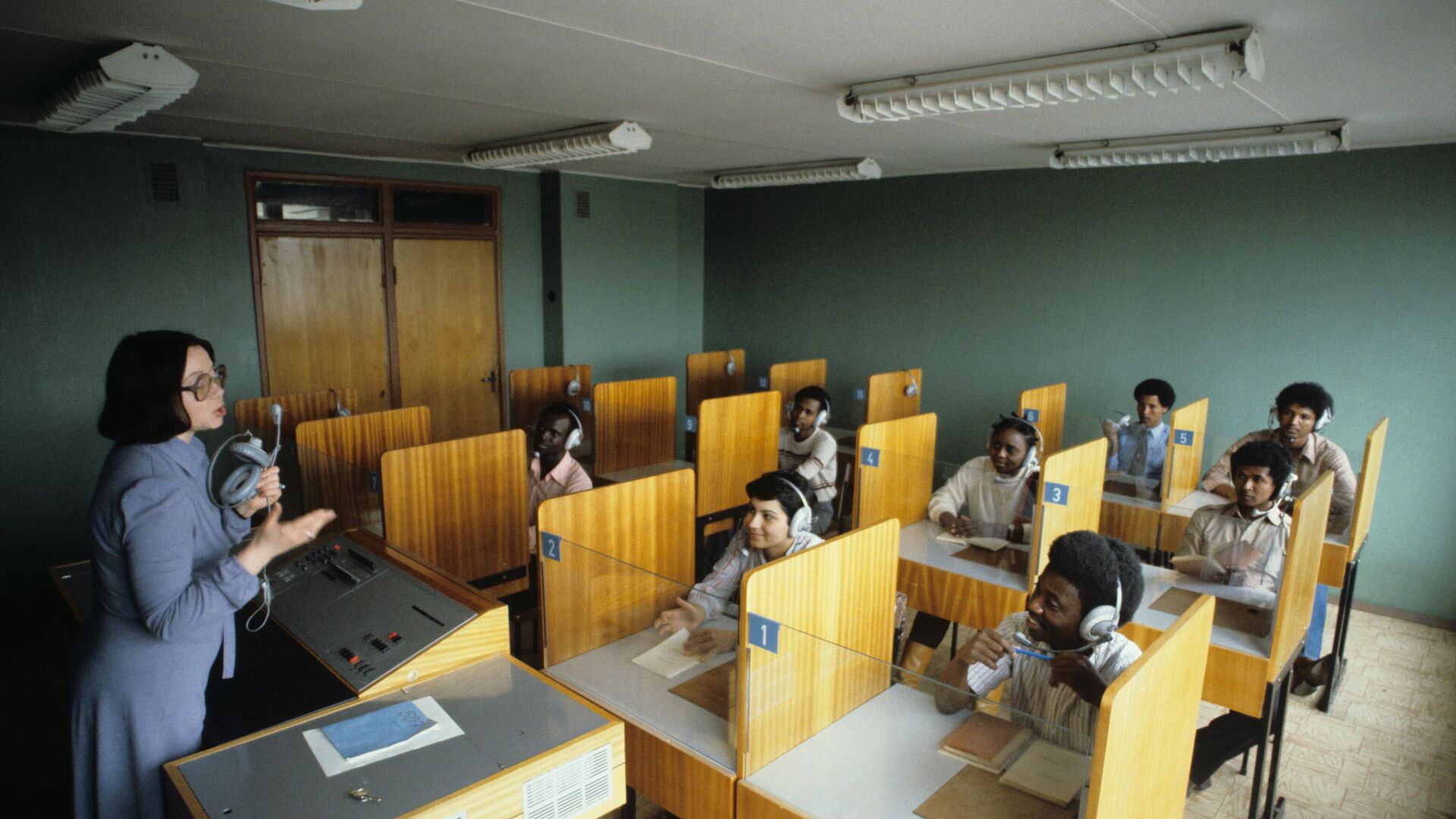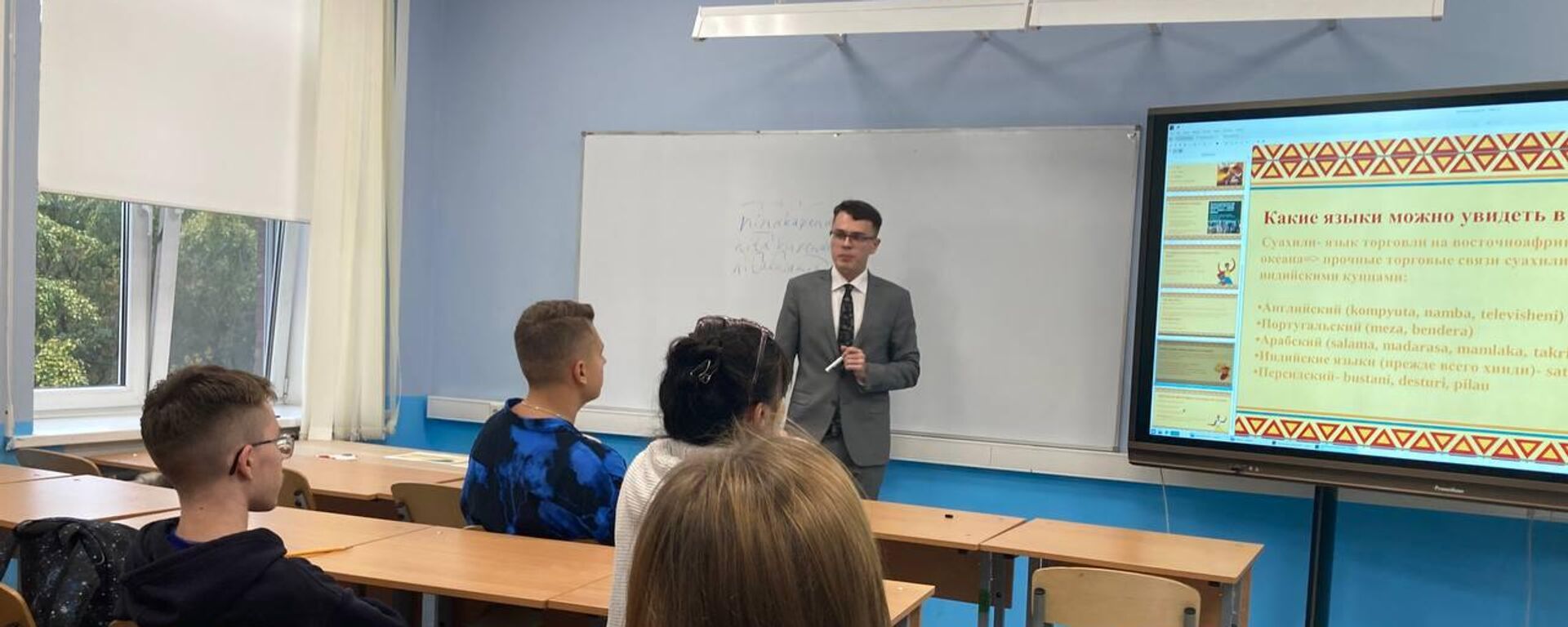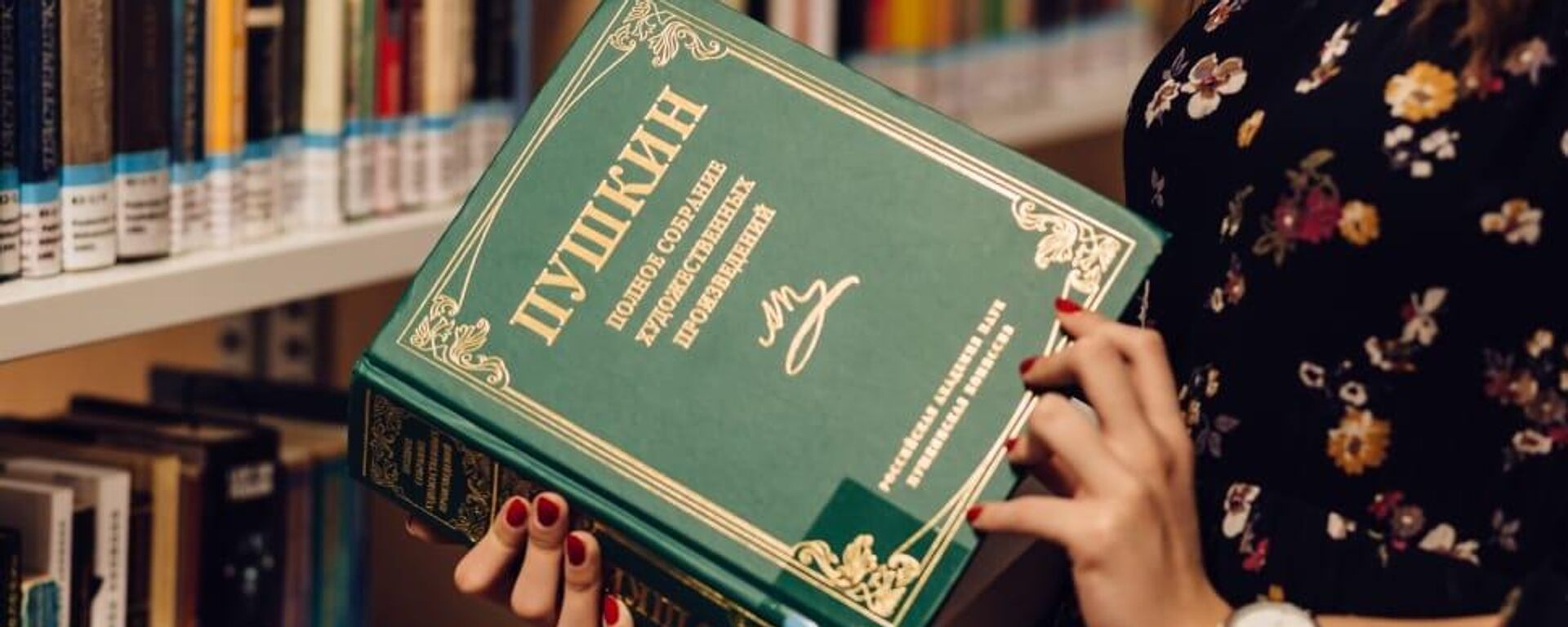https://en.sputniknews.africa/20231001/international-translation-day-language-as-tool-for-building-bridges-between-russia--africa-1062464975.html
International Translation Day: Language as Tool For Building Bridges Between Russia & Africa
International Translation Day: Language as Tool For Building Bridges Between Russia & Africa
Sputnik Africa
On September 30, the world observed International Translation Day to pay tribute to the crucial work of language professionals, who play a vital role in... 01.10.2023, Sputnik Africa
2023-10-01T15:01+0200
2023-10-01T15:01+0200
2023-10-01T15:01+0200
russia-africa cooperation
language
learning language
russian language
language center
moscow
russia
tanzania
moscow state linguistic university (mslu)
https://cdn1.img.sputniknews.africa/img/07e7/0a/01/1062471593_0:146:3123:1903_1920x0_80_0_0_07132bb795fcab0294443bd2f8360688.jpg
The ties between Moscow and Africa extend beyond economic or military collaborations, among other things, encompassing cultural cooperation. As the relationship between Russia and the continent strengthens, linguists and translators are playing an increasingly vital role in breaking down language barriers between the nations.On the occasion of International Translation Day, Sputnik Africa interviewed three language experts to explore the importance of translation in overcoming cultural and linguistic differences.In Russia, the learning of African languages is actively progressing, thus allowing for better communication and mutual understanding between the country and nations from all over the continent, said Maria Pokrovskaya, a lecturer at the Moscow State Linguistic University, in an interview with Sputnik Africa.Pokrovskaya shared her experience from the internship in Tanzania, noting that she was surprised and amazed at how good-natured and open the people were. When the Tanzanians found out that the students could communicate in Swahili, she continued, "we immediately became locals to them, like family members."According to Pokrovskaya, it is much easier to understand people, their way of thinking and aspirations, their culture and traditions with the help of their language. Speaking of her visit to Tanzania, she expressed her fascination with the country's slower pace of life. She described it as calm, peaceful, and serene, especially in comparison to the hustle and bustle of Moscow. She was impressed by the genuine warmth of the local people and the peacefulness of life in Africa, hoping to integrate these aspects into her daily routine.Translator as Mediator Between CulturesThis viewpoint is shared by another Sputnik Africa interviewee, Milena Konyaeva, a student at the Institute of Asian and African Studies, Moscow State University, who teaches Amharic at school. She emphasized the significance and benefits of language proficiency when traveling to an African nation.She noted that Russia and Ethiopia share "common ground" in many areas and have long-standing bilateral relations in trade and culture. According to Konyaeva, "translator plays a role of mediator in the dialogue of cultures." Thus, language skills are the basis for mutual understanding between representatives of different countries and cultures. Studying Amharic provides valuable insight into Ethiopian culture and customs, she continued. For example, Ethiopians often show respect by bowing and use both hands when passing objects or shaking hands. Additionally, before discussing the main topic during conversations, she explained, it is customary to ask about one's well-being and the health of one's relatives.Konyeava noted that in Amharic, translation work is complex due to the language's multiple word meanings. For instance, the term "birr" refers to both the national currency and silver. She stated that a competent translator should be aware of all the linguistic and cultural nuances since they bear a great responsibility of accurately conveying meanings.The success of negotiations may hinge on the quality of translation, while errors that alter the intended meaning can significantly complicate the process. According to the student, an interpreter is a representative of the country and its people, and their speech and translation can shape one's opinion on the nation as a whole.At the same time, Russian is attracting more interest in Africa, despite the difficulties posed by declensions and verb aspects, according to Bellon Beaugrel Akoliokala, a translator and instructor at the Russian House in Brazzaville, Republic of the Congo, interviewed by Sputnik Africa.Moscow is working on the establishment of cultural centers in Africa to offer Russian lessons to locals. According to Russia's Ministry of Education, the country plans to open Russian language education centers in 28 African nations this year. Algeria has recently launched one such center, while the Democratic Republic of the Congo and the Central African Republic have also expressed interest in promoting cultural cooperation with Russia.
https://en.sputniknews.africa/20230925/opening-new-doors-for-children-all-about-arrival-of-swahili-language-in-russian-schools-1062347050.html
https://en.sputniknews.africa/20230611/russian-language-education-centers-to-open-in-28-african-countries-this-year-official-1059852501.html
moscow
russia
tanzania
Sputnik Africa
feedback@sputniknews.com
+74956456601
MIA „Rossiya Segodnya“
2023
News
en_EN
Sputnik Africa
feedback@sputniknews.com
+74956456601
MIA „Rossiya Segodnya“
Sputnik Africa
feedback@sputniknews.com
+74956456601
MIA „Rossiya Segodnya“
russia-africa cooperation, language, learning language, russian language, language center, moscow, russia, tanzania, moscow state linguistic university (mslu)
russia-africa cooperation, language, learning language, russian language, language center, moscow, russia, tanzania, moscow state linguistic university (mslu)
International Translation Day: Language as Tool For Building Bridges Between Russia & Africa
On September 30, the world observed International Translation Day to pay tribute to the crucial work of language professionals, who play a vital role in uniting nations, promoting dialogue and understanding, and fostering cooperation across the world.
The ties between Moscow and Africa extend beyond economic or military collaborations, among other things, encompassing cultural cooperation. As the relationship between Russia and the continent strengthens, linguists and translators are playing an increasingly vital role in breaking down language barriers between the nations.
On the occasion of International Translation Day, Sputnik Africa interviewed three language experts to explore the importance of translation in overcoming cultural and linguistic differences.
In Russia, the learning of African languages is actively progressing, thus allowing for better communication and mutual understanding between the country and nations from all over the continent, said Maria Pokrovskaya, a lecturer at the Moscow State Linguistic University, in an interview with Sputnik Africa.
Pokrovskaya shared her experience from the internship in Tanzania, noting that she was surprised and amazed at how good-natured and open the people were. When the Tanzanians found out that the students could communicate in Swahili, she continued, "we immediately became locals to them, like family members."
"During our internship in Tanzania, we had conversations with the locals and I was surprised to see how open and caring they were [...]. Knowing the language helps build mutual understanding. When you communicate with Africans in their language, they begin to trust you and open up more," she explained.
According to Pokrovskaya, it is much easier to understand people, their way of thinking and aspirations, their culture and traditions with the help of their language.
Speaking of her visit to Tanzania, she expressed her fascination with the country's slower pace of life. She described it as calm, peaceful, and serene, especially in comparison to the hustle and bustle of
Moscow. She was impressed by the genuine warmth of the local people and the peacefulness of life in Africa, hoping to integrate these aspects into her daily routine.
Translator as Mediator Between Cultures
This viewpoint is shared by another Sputnik Africa interviewee, Milena Konyaeva, a student at the Institute of Asian and African Studies, Moscow State University, who teaches Amharic at school. She emphasized the significance and benefits of language proficiency when traveling to an African nation.
She noted that Russia and Ethiopia share "common ground" in many areas and have long-standing bilateral relations in trade and culture. According to Konyaeva, "translator plays a role of mediator in the dialogue of cultures." Thus, language skills are the basis for mutual understanding between representatives of different countries and cultures.
"A translator, in the past and present, serves as a cultural mediator, facilitating mutual comprehension among individuals from diverse nations," she said.
Studying Amharic provides valuable
insight into Ethiopian culture and customs, she continued. For example, Ethiopians often show respect by bowing and use both hands when passing objects or shaking hands. Additionally, before discussing the main topic during conversations, she explained, it is customary to ask about one's well-being and the health of one's relatives.
"Literally everything was new to me. The unique writing system that has existed for two thousand years [...]. But the main discovery for me was that the Ethiopian people are very open and hospitable. They willingly enter into dialogue in their mother tongue. It is no exaggeration to say that Amharic is the key to the hearts of Ethiopians," she said.
Konyeava noted that in Amharic,
translation work is complex due to the language's multiple word meanings. For instance, the term "birr" refers to both the national currency and silver. She stated that a competent translator should be aware of all the linguistic and cultural nuances since they bear a great responsibility of accurately conveying meanings.
The success of negotiations may hinge on the quality of translation, while errors that alter the intended meaning can significantly complicate the process. According to the student, an interpreter is a representative of the country and its people, and their speech and translation can shape one's opinion on the nation as a whole.
At the same time, Russian is attracting more interest in Africa, despite the difficulties posed by declensions and verb aspects, according to Bellon Beaugrel Akoliokala, a translator and instructor at the Russian House in Brazzaville, Republic of the Congo, interviewed by Sputnik Africa.
"The Russian language is undeniably one of the most challenging to learn [...]. A translator should have expertise in two distinct language cultures. It is a very serious and very difficult profession. In today's world, a translator serves as a bridge between the two countries' realities," he said.
Moscow is working on the establishment of cultural centers in Africa to offer Russian lessons to locals. According to Russia's Ministry of Education, the country
plans to open Russian language education centers in 28 African nations this year. Algeria has recently launched one such center, while the Democratic Republic of the Congo and the Central African Republic have also expressed interest in promoting cultural cooperation with Russia.



